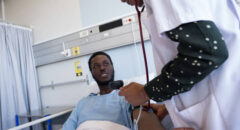
When it comes to your body and how it functions, there is never a guarantee of what may happen over time. For some people, their bodies might stay perfectly fine all of their life (lucky them). For others, that may not be the case. Sometimes sickness happens internally, sometimes accidents happen externally. Regardless of what illness or harm can come to the internal or physical part of your temple, things do happen and develop because that’s how life works. Even with that in mind, it’s important to remember that you do have some type of control over what your body goes through. For example, when it comes to having a flatter stomach, you have the control of healthy dieting and exercising. Or even when it comes to preventing kidney damage, you have a lot more control over that than you may think.
Why Kidneys Are Such An Important Part Of Your Body
Just about every part of your body has a level of significance that you should know about, but your kidneys are extremely essential.
Your kidneys are the one or two functions that cleanse your body.
They remove waste, fluids and acidic toxins from your body that the body’s cells produce. Think of your kidneys as your body’s cleanser.
They also help with what goes in your blood. Your kidneys balance out the amount of sodium(salts), water and minerals in your bloodstream.
Your body needs this because if your kidneys don’t balance out what flows through your bloodstream, it can affect how other parts of your body function such as your muscles, nerves, tissues and more.
Your kidneys also make the hormones that help to make red blood cells, the hormones to help keep your bones strong and the hormones that help control your blood pressure.
RELATED: 5 Ways to Catch Kidney Damage Early
Can Kidney Disease Be Prevented?
Since the kidneys do so much for the body, it’s only right to think that they’re basically one of the superheroes living inside of every human’s temple right? Well, it’s easy to think that way but every superhero has a weakness. Superman had kryptonite, your kidneys have kidney disease. Chronic kidney failure (or disease) is when your kidneys no longer function how they need to. Kidney failure happens when the








